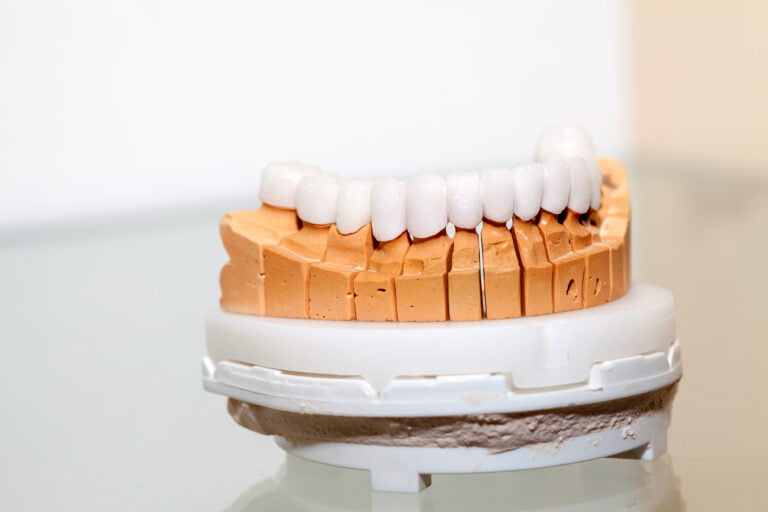Dental Restoration With Dental Crowns

When it comes to dental restoration, dental crowns serve as a reliable solution for addressing various tooth issues. From strengthening weak teeth to enhancing the overall look of your smile, crowns offer a range of benefits. But have you considered the different types of materials used for crowns? Understanding this aspect can help you make an informed decision about your dental health.
Benefits of Dental Crowns
Dental crowns offer significant benefits for improving the appearance and functionality of damaged teeth. When it comes to longevity and durability, dental crowns are a top choice. With proper care, they can last over 10 years, providing a long-term solution for strengthening weakened or cracked teeth.
Not only do crowns offer protection, but they also enhance the cosmetic appearance of teeth. By covering discolored or damaged teeth, crowns can restore a natural and appealing look to your smile.
In addition to their cosmetic enhancement, dental crowns play a crucial role in supporting dental bridges and implants. This added functionality contributes to improved chewing function and overall oral health.
Whether you’re looking to restore a single damaged tooth or support a dental prosthesis, crowns offer a versatile and durable solution. By opting for dental crowns, you’re investing in both the aesthetic appeal and the long-term health of your smile.
Dental Crown Procedure Overview
The procedure for placing dental crowns typically involves two appointments for preparation and placement. During the first visit, crown preparation begins with reshaping the tooth to ensure a proper fit for the crown. Impressions of the tooth are then taken to create a custom crown. A temporary crown is placed to protect the tooth while the permanent crown is being fabricated.
In the second appointment, the temporary crown is replaced with the permanent one. The permanent crown is carefully fitted and then bonded in place using dental cement. This ensures a secure and long-lasting restoration.
Temporary crowns serve as placeholders until the permanent crown is ready, offering protection and maintaining the aesthetics of the smile. Once the permanent crown is in place, sensitivity and dietary restrictions may be experienced initially but can be managed as part of the recovery process.
The procedure aims to restore tooth function, enhance aesthetics, and extend the longevity of natural teeth.
Risks Associated With Dental Crowns
Potential risks associated with dental crowns include enamel damage during preparation, tooth sensitivity post-placement, allergic reactions to materials, discomfort from poor fit, or bonding, and the possibility of infection or decay if oral hygiene is neglected.
Enamel damage can occur during the process of preparing the tooth for a crown, which may lead to sensitivity or other issues. Post-crown placement, some individuals may experience tooth sensitivity, especially to hot or cold temperatures.
Allergic reactions to crown materials are rare but can manifest as oral discomfort or inflammation. Discomfort may also arise if the crown doesn’t fit properly or if there are issues with the bonding process.
Neglecting oral hygiene can result in decay or infection developing underneath the crown, emphasizing the importance of maintaining good oral care practices.
Being aware of these potential risks can help you make informed decisions and take necessary precautions when considering dental crown procedures.
Recovery After Crown Placement
After having a dental crown placed, it’s common to experience sensitivity to hot and cold foods, which typically diminishes within a few weeks. During this recovery period, it’s advisable to adhere to dietary restrictions to protect the newly placed crown.
Avoiding sticky or hard foods can help prevent damage to the crown and reduce discomfort. Good oral hygiene practices are crucial for the long-term success of the dental crown. Regular brushing and flossing help maintain oral health and prevent issues around the crowned tooth.
While discomfort or soreness in the gums around the crowned tooth may occur initially, it should improve as the tissues adjust to the crown. Follow-up visits with the dentist are essential to monitor the integration of the crown and ensure its proper function in the mouth.
Alternatives to Dental Crowns
Consider conservative options like inlays and onlays as alternatives to dental crowns for restoring teeth with minimal tooth reduction. Inlays are similar to fillings but are custom-made in a dental laboratory to fit the specific shape of the cavity. Onlays, on the other hand, are used when the damage extends to one or more cusps of the tooth. Both inlays and onlays help preserve more of the natural tooth structure compared to traditional crowns.
Veneers are another alternative to dental crowns, primarily focusing on enhancing the appearance of front teeth by covering imperfections like discoloration, chips, or gaps. While veneers are more cosmetic in nature, they can offer a conservative solution for improving the aesthetics of your smile.
In cases where a tooth is severely damaged or decayed, tooth extraction followed by dental implants may be recommended as an alternative to dental crowns. Dental bridges, which consist of pontics supported by crowns on adjacent teeth, can also serve as an alternative for replacing missing teeth without the need for individual crowns.
Depending on your specific dental needs, your dentist will recommend the most suitable alternative for optimal treatment outcomes.
Conclusion
In conclusion, dental crowns offer a durable and versatile solution for restoring damaged teeth, providing protection, support for dental bridges or implants, and enhancing smile aesthetics.
With proper care and maintenance, dental crowns can last over a decade, making them a long-term investment in oral health.
By addressing structural issues and improving tooth alignment, dental crowns play a vital role in achieving a healthy and beautiful smile.
Consider consulting with Fresh Dental Care in Kepong to determine if dental crowns is right for you.
